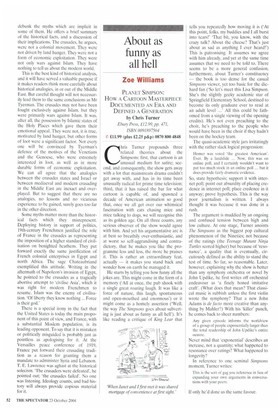About as funny as all hell
Zoe Williams
PLANET SIMPSON: How A CARTOON MASTERPIECE DOCUMENTED AN ERA AND DEFINED A GENERATION by Chris Turner Ebuty Press, f12.99, pp. 471, ISBN 0091897564 (61.11.99 (plus £2.25 p&p) 0870 800 4848 Chris Turner propounds three related theories about the Simpsons: first, that cartoon is an unusual medium for satire; second, and consequently, the show gets away with a lot that mainstream drama couldn't get away with, and has in its time been unusually radical for prime time television; third, that it has raised the bar for what cartoon is capable of, and spawned a decade of American animation so good that, once we all get over our whimsical fascination with cats chasing mice and mice talking to dogs, we will recognise this as its golden age. On all three counts, any serious observer of the show would agree with him. And yet his argumentative arc is at best so breathily over-enthusiastic, and at worst so self-aggrandising and contradictory, that he makes you like the programme less and less, the more he praises it. This is rather an extraordinary feat, actually — it makes you stand back and wonder how on earth he managed it.
He starts by telling you how funny all the jokes are. This might come in the form of a memory ('All at once, the pub shook with a single great roaring laugh. It was like a force of nature, this laugh, spontaneous and open-mouthed and enormous') or it might come as a homely assertion ('Well, the way The Simpsons goes about subverting is just about as funny as all hell'). It's like reading a critique of King Lear that
tells you repeatedly how moving it is (`At this point, folks, my buddies and I all burst into tears!' That bit, you know, with the crazy talk? About the cheese? That's just about as sad as anything I ever heard!') This is patronising. It assumes we agree with him already, and yet at the same time assumes that we need to be told to, There seems to be a more general confusion, furthermore, about Turner's constituency — the book is too dense for the casual Simpsons viewer, yet too basic for the diehard fan (`So let's meet this Lisa Simpson. She's the slightly geeky academic star of Springfield Elementary School, destined to become its only graduate ever to read at an adult level ...' All this could be fathomed from a single viewing of the opening credits). He's not even preaching to the choir, he's preaching to the people who would have been in the choir if they hadn't been on the hockey team.
The quasi-academic style jars irritatingly with the rather slack logical progression:
Homer was voted 'the greatest American'. Ever. By a landslide ... Now, this was on online poll, and 1 certainly wouldn't want to put too much stock in an online poll hut it does provide fairly dramatic evidence.
So, state hypothesis; support it with internet poll; point out absurdity of placing credence in internet poll; place credence in it anyway; prove hypothesis. This is the way poor journalism is written. I always thought it was because it was done in a rush.
The argument is muddied by an ongoing and confused tension between high and low culture. At one stage, Turner anoints The Simpsons as the biggest pop cultural phenomenon of the Nineties; not because of the ratings (the Teenage Mutant Ninja Turtles scored higher) but because of 'resonance', a quality that is eventually, circuitously defined as the ability to stand the test of time. So far, so reasonable. Later, however, explaining why the show is better than any symphony orchestra or novel by John Updike, he first writes off orchestral endeavour as 'a finely honed imitative craft'. (What does that mean? That classical music is rubbish unless the first violin wrote the symphony? That a new John Adams is de facto more creative than anything by Mahler?) With his 'killer' punch, he comes back to sheer numbers:
Any given episode informs the worldview of a group of people exponentially larger than the total readership of John Updike's entire oeuvre.
Never mind that 'exponential' describes an increase, not a quantity; what happened to resonance over ratings? What happened to longevity?
In reference to one seminal Simpsons moment, Turner writes;
This is the sort of gag you reference in lieu of expanding your own arguments in conversations with your peers.
























































































 Previous page
Previous page